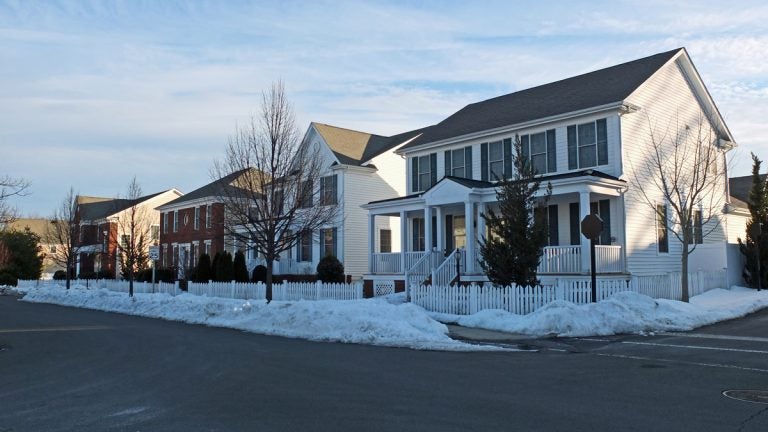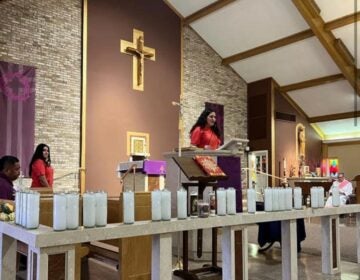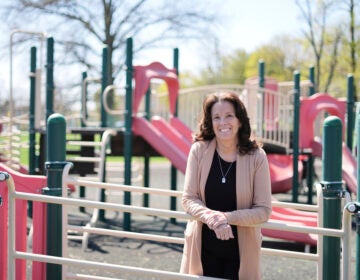Commentary: Is it time to ditch New Jersey’s property-tax system?

(Alan Tu/WHYY
In any discussion of New Jersey’s record-breaking property taxes, there are three certainties:
They’ll continue to increase.
Every elected official and candidate will pledge to act decisively to halt the increase and reduce the burden.
Nothing of consequence will be done.
It came as no surprise when the Department of Community Affairs released its findings showing that the average property tax in the state had risen to $8,353 — an increase of $191– cementing New Jersey’s first place in the nation, a position it’s occupied for years.
In Bergen and Essex counties, the average exceeded $11,000 and in four others — Union, Morris, Passaic and Somerset — it surpassed $9,000.
While the state-imposed two percent cap on increases has restrained the rate of growth, its effect has been to throttle back the locomotive from fifty miles per hour to twenty-five. Small comfort to the homeowner tied to the railroad tracks.
In his budget message this past week, Gov. Chris Christie offered his customary boast about the effectiveness of the cap, comparing it to previous administrations when he said property taxes rose by as much as seven percent per year.
At the same time, he appeared satisfied to continue to rely on the cap as the principal restraint on rising tax rates.
Aid to municipalities, long a crucial element in helping to ease the property tax burden, will be flat funded again in the coming fiscal year while the proposed one percent increase in aid to local school districts is negligible and a great many districts will experience no increase at all.
The two state programs of direct property tax relief — the homestead tax credit and the senior freeze — will remain static as well, and for many of the 650,000 homeowner beneficiaries any savings will be offset by local increases.
Property taxes have been at the top of voter concerns in poll after poll and are often cited as the major reason people — especially retirees — leave New Jersey in search of a friendlier tax climate.
Promises and solemn pledges to act to reduce the burden are a staple in campaigns at every level of government, but like the roadside signs exhorting a vote for one candidate or another, they disappear once election day passes.
Legislators place responsibility at the feet of local officials, arguing that the state does not establish or collect property taxes, while county, municipal, and school district officials complain the state has been exceptionally tight-fisted in providing assistance to help meet their ever-increasing costs.
While it surfaces periodically, there has been little serious discussion concerning systemic changes to the tax structure to address the overreliance on property-tax revenue to support local governments.
More than 1,200 entities — counties, municipalities, and school districts — look almost exclusively to property taxes to fund their operations, to pay salaries and benefits, and purchase everything from kindergarten crayons to snow plows.
Supporters of a more thorough overhaul of the tax structure argue that, while the cap has served to slow the rate of increase, it’s treated the symptoms — higher taxes — rather than the illness: an inherently unfair system based on an outdated concept that property is a more accurate measure of economic health than is income.
An infinitely more equitable system, proponents say, would involve a broad-based tax on income or consumption, one much more indicative of an individual’s ability to pay rather than the arbitrarily established value of one’s home.
Each time such a suggestion is offered, however, it is quickly and ferociously dismissed as another subterfuge to raise taxes, a cynical attempt to extract greater sums of money under the guise of tax relief or fairness.
Even proposals as seemingly innocuous as convening a constitutional convention to examine the state’s system of taxation and recommend changes subject to legislative approval failed to draw much support.
Legislators are exceedingly wary of what they perceive to be a radical, far-reaching change in tax policy, even if it can be demonstrated that an income-based system is eminently fairer than a property-based method and that such a change could lead to substantial cost reductions for a great many of their constituents.
The fear of an anti-tax backlash and accusations of support for greater government spending is genuine and sufficient to convince legislators to continue to live with an imperfect and unfair system while working largely at the margins.
There exists a sort of weary resignation that burdensome and growing property taxes are an inescapable fact of life, that the certainties surrounding them — persistent increases, pledges to act, and nothing accomplished — will never vanish.
For others, it’s a classic example of the practice of Zen politics: There is no solution; therefore, there is no problem.
_____________________________________________________________
NJ Spotlight, an independent online news service on issues critical to New Jersey, makes its in-depth reporting available to NewsWorks.
WHYY is your source for fact-based, in-depth journalism and information. As a nonprofit organization, we rely on financial support from readers like you. Please give today.




